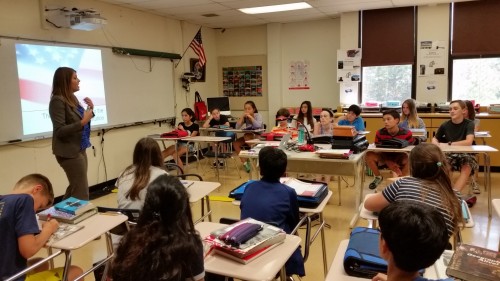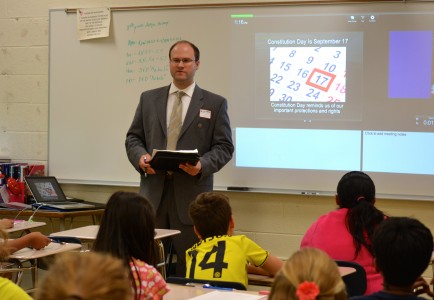By Jo Mathis
AAPS District News

Constitution Day may be one of those under-the-radar observances for most Americans. But in the Ann Arbor Public Schools, it’s yet another reason for students to learn something relevant.
AAPS elementaries observed the day in ways ranging from flag projects to patriotic music to rewriting the preamble in their own words. Second graders at Ann Arbor Open created, edited and ratified a classroom constitution, for instance, while Bach held its annual all-school assembly celebrating Constitution Day with a flag-raising ceremony and play by fourth graders, followed by individual classroom activities.
And at every middle school, local attorneys visited social studies classes, engaging students in discussions surrounding the Constitution.
That makes AAPS one lucky district, said Slauson Middle School teacher Jill McGinn.
“I’m amazed that these attorneys give up a day where they could be earning a salary to come here and talk to students about the Constitution and the judicial system and their role in all of that,” she said. “The lessons are very hands-on, very engaging. It makes Constitution Day very special, not just another day. We’re very lucky. Really.”
This was attorney Tom Oldakowski’s second visit to Slauson, and this year he concentrated on jury selection, and the difference between the American jury system and the Roman jury system set up more than 2000 years ago.

“It’s important for students to know what jury trials are about and what the Sixth Amendment is about,” he said. “I’m happy to be here to educate them on this, and hopefully inspire some to go into the legal field.”
In addition to the practical information they learn about law, teacher Walter Brown said Constitution Day is a chance for kids to see that community members care about them. Most of the adults they’re around day after day are teachers and their own parents, he said.
“So this is a chance,” he said, “for them to see other folks in the community who work and do other things.”

This is a wonderful program, with much appreciation to the Washtenaw Bar Association and the dozens of lawyers and law students who volunteer their time to prepare and present these well constructed lessons which engage students. The 6th graders learn how impartial juries are chosen; 7th graders learn the ins and outs of the 1st amendment, focusing on Freedom of Speech; and the 8th grade explores the ramifications of the 14th amendment: equal treatment under the law. After the presentations in my class, all four 7th grade classes indicated they would like an expanded Civics Unit so they would be better prepared to learn how our government and political system works so they can compare it to others during our year learning about World Culture and Geography.